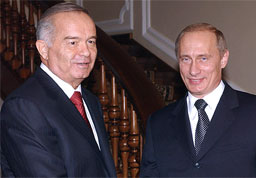(Ferghana News Agency) – Uzbekistan’s lower house of Parliament on Wednesday passed President Islam Karimov’s new foreign policy strategy, which rules out Tashkent’s membership in any military alliances and bans foreign military bases on Uzbek territory.

- Karimov and Putin in 2004
Uzbekistan, which didn’t have a specific foreign policy document until recently, rejects any membership in military alliances and “reserves its right to quit an interstate coalition if it turns into a military alliance,” Ferghana quoted the foreign policy strategy as saying.
According to the document, Uzbekistan would not host foreign military bases on its territory, a fact that would alleviate the concerns Russia has had over Tashkent’s possible cooperation with NATO ever since Uzbekistan left the Russia-led Collective Security Treaty Organization (CSTO) in late June.
At the time of Putin’s first rapprochement with Islam Karimov, the Uzbek president criticized by its western partners for shooting protesters during the bloody Andizhon events had rushed to Moscow for support. Both leaders agreed that riot in Andizhon had been inspired from Afghanistan for terrorists were “led by those who had used the religious extremist and radical forces fought against in Afghanistan and Iraq today”, as put by Islam Karimov. Thus trying to hit the West, Karimov manifested his loyalty to Moscow.
Integration model as searched within CIS, SCO or CSTO does not seem to work in the post-soviet political system in the Central Asia. Relations between states in the CIS are extremely dependent on the presidents’ personalities and Islam Karimov is exactly a person who can hardly come to terms with other countries’ leaders, especially Rahmon of Tajikistan. Now that the NATO needs Uzbekistan badly, Karimov takes advantage of the situation in order to strengthen his own standing vs. neighbours.
This launches a new stage of Tashkent’s alienation from its partners within CIS and rapprochement with the West. The United States and Europe are no longer criticizing Uzbekistan: instead, they have promised support to Karimov and even guaranteed to keep his political regime.
However, there is not necessarily a break up between Tashkent and Moscow. It simply means that relationship of Uzbekistan, Russia, CSTO and the West have returned to where it used to be some 10 years ago.

